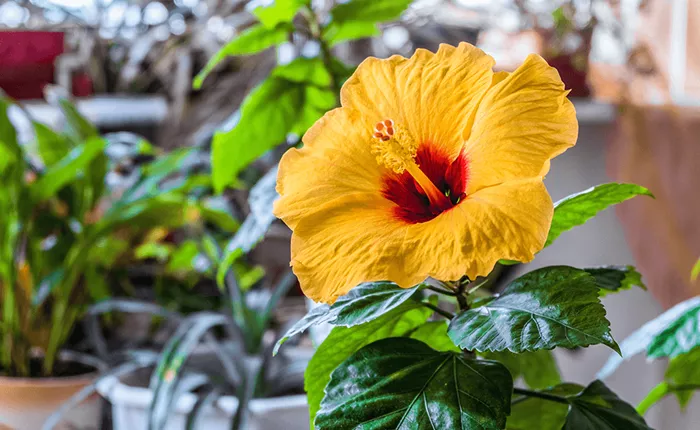Ant infestations on hibiscus plants are a common gardening challenge, often linked to the presence of other sap-sucking pests. Managing ants effectively requires understanding their behavior and the ecosystem around your plants. This article explores natural and chemical methods to kill ants on hibiscus, emphasizing safe, practical solutions that protect your plants and the environment.
Understanding Why Ants Are on Hibiscus Plants
Ants are usually attracted to hibiscus plants because of the honeydew secreted by sap-feeding insects such as aphids, mealybugs, and scale insects. These pests excrete a sugary substance that ants collect as food, and in return, ants protect these pests from natural predators, creating a problematic cycle that can harm your hibiscus. Therefore, controlling ants also involves managing these underlying pest populations.
Natural and Homemade Remedies to Kill Ants on Hibiscus
1.Soap and Water Solution
A simple and effective homemade pesticide involves mixing a teaspoon of dish soap or liquid detergent in a pint of warm water. This solution can be sprayed directly on ants and around the hibiscus plant. The soap breaks down the ants’ exoskeletons and disrupts their ability to breathe, killing them on contact. Adding a few drops of peppermint oil enhances the repellent effect. Spray treatments are best applied in the evening to avoid harming beneficial insects active during the day.
2.Citrus-Based Repellents
Ants dislike citrus scents, making lemon or orange peel an excellent natural deterrent. You can sprinkle lemon rind around the base of the plant or boil citrus rings in water to create a spray. Applying this citrus-infused water to the plant and soil can help repel ants effectively.
3.Diatomaceous Earth (DE)
Diatomaceous earth is a natural powder made from fossilized algae skeletons that physically damages ants and other insects by dehydrating them. Dusting DE around the base of hibiscus plants and on the soil surface creates a barrier that ants avoid crossing. DE is safe for plants and beneficial insects when applied correctly.
4.Chili Pepper Spray
A homemade chili pepper spray can deter ants and other pests. Mix chili powder or chopped hot peppers with water and a few drops of dish soap, steep for 24 hours, strain, and spray on affected areas. The capsaicin irritates ants and discourages them from returning.
5.Vaseline Barrier
Applying a ring of Vaseline around the base of the hibiscus trunk physically blocks ants from climbing the plant. This method is especially useful for potted plants or young shrubs.
Organic Pesticides and Oils for Ant Control
1.Neem Oil
Neem oil is a potent natural pesticide derived from neem tree seeds. It disrupts insect feeding and reproduction, effectively controlling aphids, mealybugs, and other sap-sucking pests that produce honeydew attracting ants. Dilute neem oil with water and a few drops of dish soap, then spray on both sides of leaves every 7 to 14 days for best results. Neem oil also has antifungal properties and promotes plant health.
2.Insecticidal Soap
Insecticidal soaps are potassium salts of fatty acids that kill soft-bodied insects like aphids and mealybugs on contact. They are safe for hibiscus plants and beneficial insects if used as directed. Thorough coverage, including leaf undersides, is essential.
3.Horticultural Oil
Horticultural oils smother insect pests and eggs. Applied as a fine spray during cooler parts of the day, they are effective against aphids, scale, and mites. Avoid spraying during the hottest part of the day to prevent leaf damage.
Chemical Control Options
For severe infestations, systemic insecticides such as imidacloprid or bifenthrin can be used. These chemicals are absorbed by the plant and kill pests feeding on it, indirectly reducing ant populations by eliminating their honeydew sources. However, these should be used cautiously, following label instructions, as they may harm beneficial insects and pollinators. Chlorpyrifos and carbaryl are also effective but can cause leaf drop and environmental harm, so they are recommended only for heavy infestations and with protective measures.
Integrated Pest Management (IPM) Approach
Combining methods offers the most sustainable solution. Regularly inspect hibiscus plants for aphids and other pests, use natural repellents and barriers to keep ants at bay, and apply organic pesticides when necessary. Mechanical removal of pests by washing or handpicking helps reduce pest populations without chemicals. Encouraging beneficial insects like ladybugs and hoverflies can naturally control aphids and reduce honeydew production, indirectly controlling ants.
Conclusion
Killing ants on hibiscus plants requires a holistic approach that targets both the ants and the sap-sucking pests they farm. Natural remedies such as soap sprays, citrus repellents, diatomaceous earth, and neem oil provide effective, eco-friendly control. For stubborn infestations, carefully selected chemical treatments maybe necessary. Combining these strategies within an integrated pest management framework ensures healthy hibiscus plants, vibrant blooms, and a balanced garden ecosystem.
By understanding ant behavior and employing a variety of safe control methods, gardeners can protect their hibiscus plants from ant damage while nurturing a thriving, natural garden environment.


